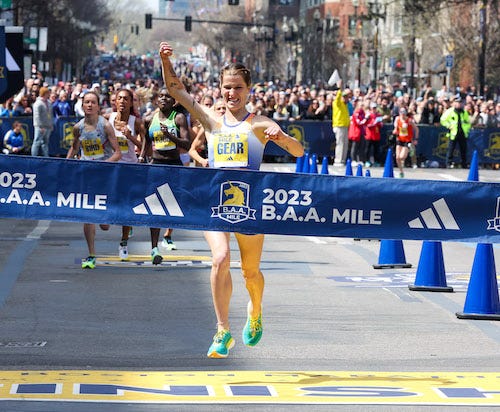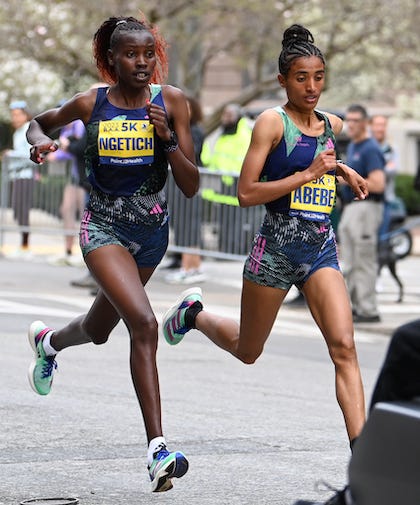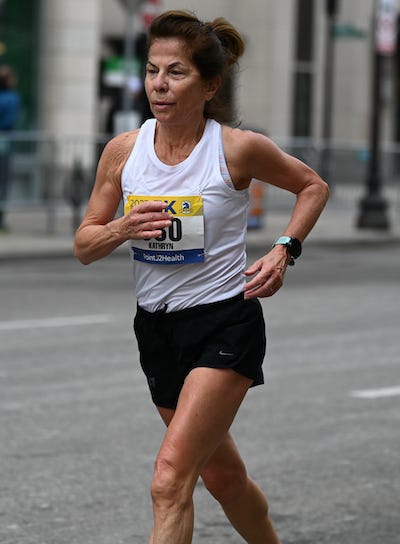

Discover more from Fast Women
Fast Women: It's Marathon Monday!
Issue 232, presented by OOFOS
Note: To avoid covering the Boston Marathon a week after it happens, I’m planning to send out an extra issue of Fast Women tomorrow. This newsletter will return to its regular once-a-week schedule after that.
Appreciating a fast woman who led the way
It’s Marathon Monday here in the Boston area, and in several hours, roughly 30,000 people will begin lining up in Hopkinton for their chance to run 26.2 miles to Boston. This year’s race seems to have more hype around it than any previous Boston I can remember.
Though I tend to watch the race mid-course these days, I went into Boston on Saturday to watch the B.A.A. 5K and Invitational Miles and get a little dose of the marathon energy. There are so many shakeout runs, live podcasts, and places to be on marathon weekend that it has become hard to keep up. Someone told me she didn’t remember it being quite like this 10+ years ago, and that’s because it wasn’t.
One of the biggest highlights of my Saturday was having the opportunity to meet 1973 Boston Marathon champion Jacqueline Hansen. It’s been 50 years since she won the second official women’s race in Boston, and she says that day changed her life. Hansen was also a world record holder in the marathon—the first woman to break 2:40. Not only did she blaze a trail with her running performances, she also worked hard to create opportunities for the women who followed her.
Hansen, now 74, never had the chance to run in an Olympic Marathon, because the event didn’t exist when she was at her peak. But as president of the International Runners Committee, she fought for the inclusion of the women’s marathon in the 1984 Olympic Games, and later the addition of the 10,000m (in 1988) and 5,000m (in 1996). For more on her story, you can check out her website or listen to her on C Tolle Run, Starting Line 1928, or, for a deeper dive, the Women’s Running Coaches Collective podcast part one and part two or read her book.
Hansen will serve as the starter for today’s professional women’s race, and when the gun goes off, I will think about not only the race ahead but also the role Hansen has played in making the sport everything that it is today.
How to follow today’s race
It’s been 10 years since the Boston Marathon bombings, and because of the anniversary, there’s been a lot more coverage of the tragedy this year. I’ve found that it doesn’t serve me to dive into much of the content, so I’m mostly skipping it. I’m also not going to include a lot of pre-race articles here, because they’ll soon become less timely, but if you’re looking for more of that type of content, I have posted a lot of it in the Fast Women Twitter feed. And Erin Strout wrote an article about some of the storylines in the women’s race.
If you’re looking to watch the race, it will be on ESPN nationally and WCVB in the Boston area. (More details here)
Helpful links: Start lists | Uniform guide | Live results (also available via the B.A.A. Racing app)
Select start times:
9:02 a.m. ET Men’s wheelchair
9:05 Women’s wheelchair
9:37 Professional men
9:47 Professional women
9:50 Para athletics division
10:00 Wave 1
10:25 Wave 2
10:50 Wave 3
11:15 Wave 4
Thanks to OOFOS for sponsoring Fast Women this month!
Today is the big day! Good luck to all the runners. Whether you’re conquering 26.2 miles or putting in some quality time cheering along the race route today, OOFOS has you covered. Stop by Mile 27, the Ultimate Recovery Experience at 799 Boylston St., for an immersive and shoppable destination for all of your Active Recovery needs.
Mile 27 is THE spot for watching the marathon or recharging after. The OOFOS Ultimate Recovery Experience opens at 9 a.m. this morning for an all-day watch party, boozy breakfast bar from 9:00 a.m.–1:00 p.m., a chocolate milk vending machine, tech-charging stations, recovery stations with Normatec and Hyperice, as well as free medal engraving from 3:00 p.m.–7:00 p.m. And all this fun continues through the day on Tuesday.
For those who aren’t familiar, OOFOS is the global leader in Active Recovery footwear. Designed with proprietary OOfoam ™ technology, OOFOS absorb impact so your body doesn’t have to. Combined with a patented footbed design, OOFOS cradle the heel and arches for the optimal combination of soft and stable support. OOfoam™ technology is proven to absorb 37% more impact than traditional foam materials, decrease load rates up to 88% and reduce energy exertion on the ankles by as much as 47%—all of this reducing load and stress, so you can recover faster and get back to doing what you love*.
*Based on a 2018 University of Virginia School of Medicine Speed Clinic
If you watch one race from last week…
…It should be the Bryan Clay Invitational 800m. I’m purposely not putting any spoilers in the first handful of sentences, in case you want to go do that now. I watched knowing the result but still didn’t see how it was possible most of the way.I think that if this event had a better quality broadcast that was easier to access, this race would be everywhere right now, being used as evidence that one should never give up.
Now the spoilers. LSU’s Michaela Rose went out aggressively, hitting 400m in 58.28 seconds. Rose hung tough on the second lap as well, and ran 1:59.08, becoming the second-fastest woman ever in the NCAA, behind only Athing Mu. Though she has run a 1:58.40 relay leg, this was Rose’s first time under 2:00 in an open race.
Nikki Hiltz, who had never broken 2:00 in any setting, was in fourth place halfway into the race, and moved up to a distant third with 200m to go. Just as the commentator was saying Hiltz was going to run out of room to catch Rose, Hiltz passed Rose on the inside, and won the race in 1:59.03. It was a very dramatic way to win, and Hiltz not only dipped under 2:00, they nearly broke 1:59 as well. “This season is all about letting go of outcomes. And so far I’ve learned that success = racing for every place until the line, and the time and place will come from competing,” they wrote on Instagram.
Behind the top two, the depth was impressive with BYU’s Claire Seymour running a school record of 2:00.04. Elise Cranny, in fourth, ran 2:00.25 in her outdoor opener, lowering her PR by 0.24 seconds. And in fifth, Texas’ Valery Tobias ran a Mexican record and a school record of 2:00.31. (Results)
And if you read one article from last week…
…I highly recommend Alexis Okeowo’s New Yorker article that looks at Agnes Tirop and Damaris Mutua’s murders and the larger problems of intimate partner violence and exploitation of women in Kenya. Tirop, a world champion, was murdered in October 2021 and Mutua was murdered six months later, but neither story has gotten this level of attention until now. It’s a long read, so plan to carve out some time for it. (If you run into the paywall and paying to read it isn’t in the cards, Bloomberg published an article looking at the same issues one day later.)
Other News and Links
Des Linden’s book, Choosing to Run, made The New York Times best seller list last week. Along with Lauren Fleshman’s Good for a Girl and Kara Goucher’s The Longest Race, Linden’s book is the third memoir about women’s distance running to become a NYT best seller in 2.5 months. I grew up drawing a lot of my running inspiration mostly from men’s running stories, because that was what was out there. This is a thrilling moment, and I hope it’s just the beginning. There’s clearly a market for women’s sports stories.
Sarah Lorge Butler wrote a good piece about what’s behind the current elite runner baby boom (Runner’s World). And speaking of which, I completely missed that Makenna Myler’s baby was born several weeks ago. Sarah Sellers had her second baby last week. And Elaina Tabb announced that she is 20 weeks pregnant.
On Thursday, Edna Kiplagat was officially honored as champion of the 2021 Boston Marathon, after Diana Kipyokei was stripped of her title after a positive doping test.
NC State put out a nice video on Katelyn Tuohy, highlighting her collegiate athletic success, and I’m also glad to see her having fun along the way.
Though this article was mostly about Francie Larrieu Smith’s history with the Statesman Capitol 10,000, I appreciated that it included some of the five-time Olympian’s broader story, both past and present.
In this 10-minute video, Molly Seidel talks about her experience with ADHD and OCD.
Mary Cain received a $25,000 grant from the U.S. Olympic & Paralympic Foundation for her work with Atalanta NYC.
Carmen Pelar Graves published some tips for athletes who are looking to continue running at a high level post-collegiately but aren’t going to get the big contracts.
Additional Results
Ethiopia’s Mekides Abebe (15:01) edged out Kenya’s Agnes Ngetich (15:02) to win the B.A.A. 5K, held on Saturday in conjunction with the Boston Marathon. Annie Rodenfels was running in fifth place with about a quarter mile to go, but Kenya’s Jesca Chelangat fell going around the race’s final turn, which dropped her to fifth (15:15) and Rodenfels put in a surge to catch Weini Kelati and edge her out for third place, 15:12 to 15:13. Rodenfels, who won the B.A.A. Invitational Mile last year, ran less than four seconds slower than her track PR, so she appears to be ready for a good season. Susannah Scaroni, who will also race today, won the wheelchair race in 11:10. Steph Bruce, who is 16 weeks pregnant, ran the race in 17:04. And Kathryn Martin, 71, set a pending American 70–74 age-group record of 21:27, which is 6:55 per mile. And if this Wikipedia page is correct, it’s also a pending world record. (Results | Brief finish video)
Krissy Gear, a first-year pro for HOKA NAZ Elite, took off heading into the final turn of Saturday’s B.A.A. Invitational Mile and won the race with room to spare, in 4:40. Great Britain’s Lizzie Bird took second (4:43), and Kenya’s Susan Ejore took third (also 4:43). (Results | A few video highlights)
In her first open race of the outdoor season, Arkansas’ Britton Wilson set a collegiate 400m record of 49.51 seconds (watch here) at the Tom Jones Memorial. She took 0.06 seconds off the record previously held by Athing Mu. (Wilson’s indoor collegiate record, 49.48, is still slightly faster.) After the current crop of sprinters, hurdlers, and jumpers made history indoors, this is just the beginning of what’s sure to be another history-making season. Wilson also won the 400m hurdles in a world-leading 53.23.
At the same meet, Texas’ Julien Alfred won the 200m in a Saint Lucian record of 21.91 seconds, and she also ran a wind-aided (2.4 m/s) 10.72 100m. Pro Emily Richards and Florida’s Imogen Barrett went 1–2 in the 800m, running 2:00.82 and 2:00.96, respectively. (Results)
After running the 2:00.25 800m mentioned above, Elise Cranny won the Bryan Clay Invitational 1500m in 4:07.07 one day later. It was a low-key season opener for the Bowerman Track Club pro, who hadn’t raced since the Millrose Games. Running in a separate heat, Georgetown’s Melissa Riggins had the second-fastest time of the day, 4:10.09, a seven-second PR. Riggins has run 2:03.50 for 800m, but this was a breakthrough run for her. UCLA’s Mia Barnett had a solid lead with 100m to go, but Riggins ran her down and won by 0.14 seconds (1500m results).
Also at the Bryan Clay Invitational, Alabama’s Mercy Chelangat (31:55.80) and Hilda Olemomoi (32:05.83) went 1–2 in the 10,000m. Chelangat is the reigning NCAA 10,000m champion and both surpassed her school record. Chelangat moved to seventh on the NCAA all-time list (10,000m results). Utah Valley’s Everlyn Kemboi is in the midst of a breakthrough season. Two weeks after her 32:03 10,000m, she won the 5,000m in an NCAA-leading 15:20.67. New Mexico’s Elise Thorner won the steeplechase in an NCAA-leading 9:39.39 (steeple results).
Stanford first year Juliette Whittaker pulled off an impressive double at the Mt. SAC Relays, winning the 1500m on Friday (4:12.49 to 4:13.27 over NCAA indoor mile champion Olivia Howell of Illinois) and the 800m on Saturday (2:01.79). You can watch the last lap of her 1500m, which she covered in 62.09 seconds, here. Whittaker’s time was a PR by more than seven seconds, though she hasn’t raced the distance many times (1500m results). And you can watch the dramatic finish of the 800m here. Stanford’s Roisin Willis edged out Adidas pro Sammy Watson for second, 2:01.97 to 2:01.98 (800m results).
Also at Mt. SAC, China’s WuGa He won the 10,000m in 32:25.35, and Winona State’s Lindsay Cunningham was the top collegian in second (32:43.64), the third-fastest NCAA DII time ever (10,000m results). Former University of Portland runner Veerle Bakker won the 5,000m in 15:39.42 (5,000m results)
Bahrain’s Eunice Chumba won the Rotterdam Marathon in 2:20:31. Bridget Belyeu of the U.S. finished 15th in 2:33:44 and Annmarie Tuxbury finished 17th in 2:35:59. (Results)
Kenya’s Shyline Jepkorir Toroitich won the Enschede Marathon, in the Netherlands, in 2:22:45. Jessica Watychowicz was the top American, finishing sixth in 2:35:17. (Results)
South Africa’s Gerda Steyn won her fourth consecutive Two Oceans Marathon (which is 56K/34.8 miles) and improved her course record to 3:29:06. To put things in perspective, she split 2:35:56 for the marathon and then kept going. (Results)
Canadians Leslie Sexton and Malindi Elmore went 1–2 at Sunday’s Vancouver Sun Run 10K, running 32:22 and 32:35, respectively. Lindsay Flanagan was the top runner from the U.S., finishing fourth in 32:59. (Results)
I’m not sure I will ever understand the equalizer race at Hawaii’s Hapalua Half Marathon, but Jessa Hanson ran 1:13:04 and Molly Seidel ran 1:18:08. (Results)
Podcast Highlights
I enjoyed this episode of Sidedoor about Sunita Williams’ 2007 “Boston Marathon” in space, and it features some nice race history from the first two women to run it, Bobbi Gibb and Kathrine Switzer. (If you’re running Boston, this could be a good one to listen to on the way to Hopkinton.)
If you want to know how Alexi Pappas ended up running the LA Marathon with Diplo, and much more, this episode of the Ali on the Run Show has all the answers.
If all goes as planned, Patty Hung will run her 37th consecutive Boston Marathon today to break the women’s streak record. Learn more about her on Women’s Running Stories.
Des Linden and Kara Goucher discussed the behind-the-scenes details of the Olympic experience on Nobody Asked Us.
High school senior Juliette Laracuente-Huebner, who single handedly won an Ohio state team title indoors this past winter, was on Lactic Acid.
Additional Episodes: Puma Elite’s Natosha Rogers and Fiona O’Keeffe on the Beer Mile podcast (they come on at the 10:20 mark) | New Balance Boston’s Emily Mackay on I’ll Have Another | Laura Thweatt on Lactic Acid | Diane Nukuri on Running for Real | Eileen Claugus on Starting Line 192
Upcoming
It’s hard to believe the London Marathon is on Sunday morning. Unfortunately FloTrack, which requires a subscription, seems to be the only place to watch it in the U.S. without a VPN. You can see who is running here.
Stanford’s Payton Jordan Invitational begins on Friday, it will be on FloTrack as well, and you can see who is entered here.
Thanks to OOFOS for supporting Fast Women—they’re truly the perfect post-marathon sponsor—and to everyone who helps keep this venture going with your support via Patreon and Venmo. I hope you all have a great week, and look for a bonus newsletter towards the end of the day tomorrow.
Alison








